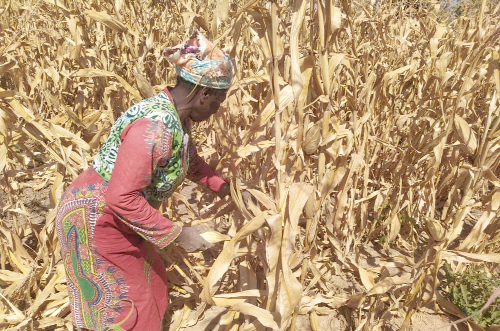
Making smallholder farmers relevant - Agric Ministry, IFAD, other partners intervene
The COVID-19 pandemic that brought the world to its knees, particularly last year, and is still lurking around is potentially a threat to food security in the country.
This is because smallholder farmers, who are the main actors in maintaining food security in the country, producing about 90 per cent of the staple food we consume in Ghana, have been badly affected.
Advertisement
Interventions
To ensure that smallholder farmers remain relevant and competitive and ensure that food remains on our dining tables, the International Fund for Agricultural Development (IFAD) and the Ministry of Food and Agriculture teamed up to cushion them against the effects of COVID-19 to avert any food security issues.
Consequently, a new project, the Emergency Support to Rural Livelihoods and Food Systems Exposed to COVID-19 (ESRF), was developed by IFAD, MOFA and other partners to provide funding to support the farmers.
The ESRF
The ESRF has been designed to protect livelihoods and incomes and to build the resilience of the target groups suffering from the impacts of the COVID-19 pandemic and climate change.
It is expected that the ESRF will mitigate the threats to production, food security and market access posed by the COVID-19 pandemic and climate change.
The ESRF’s expected results are that the targeted households will maintain or increase their production, food security and climate change resilience relative to their pre-COVID-19 situation.
It is expected that the targeted households will maintain or increase their market linkages, sales volumes and income levels from market participation relative to their pre-COVID-19 situation.
Contribution of IFAD
Under the cash transfer component of the ESRF which was launched on March 16, 2021, the IFAD is supporting the extremely vulnerable farmers, including People Living with Disability from eight poor districts in the country with an amount of 1.5 million USD.
IFAD has also made provision for PPEs and training on preventing COVID-19 spread.
Under the funding arrangement of ESRF, IFAD is contributing 20 million USD, while contributions from other development partners, the Government of Ghana and beneficiaries will be provided in cash and in kind.
Implementation of ESRF
For prudent implementation, the ESRF is nested under the Ghana Agricultural Sector Investment Programme (GASIP), which has the objective to sustainably reduce poverty in rural Ghana by increasing profitability and resilience to climate change of agribusinesses & smallholder farmers.
In the past two years, the GASIP has demonstrated that when given more resources, it will execute more activities that will cause a catalytic transformation among smallholder farmers.
To see to the transformation of the smallholder farmers, the IFAD, MOFA and other partners have developed a concept note for a new programme dubbed: the Livelihood and Productivity Enhancement of Smallholder Farmers (PROSPER).
“This 105 million USD programme will help consolidate the current gains of GASIP and expand the activities to cover other value chains. IFAD is contributing 60 million USD.
“PROSPER will enable Ghana’s smallholder farmers to become competitive, meet market demands and, therefore, increase rural incomes,” the National Programme Coordinator of GASIP, Mr Klutse Kudomor, told the Daily Graphic in an interview.
Areas for 2021
Mr Kudomor explained that the activities of 2021 would focus on implementing the ESRF, facilitating the approval processes of PROSPER and consolidating the gains made under GASIP.
He identified the areas to tackle this year to include capacity building of FBOs and SHFs to engage and strengthen market linkages, increasing support for women and the youth and supporting SHFs with processing facilities and farm implements.
Additionally, he said the programme would develop commercial and public infrastructure and also mainstream climate change into all components of the programme.
“GASIP, ESRF and PROSPER are all serving as a flexible vehicle for MoFA’s smallholder farmer value chain development, aligning with the government’s agenda for transforming agriculture,” Mr Kudomor stated.



